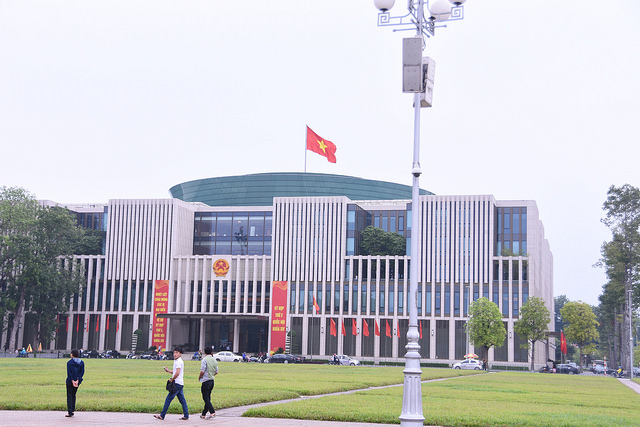Bradley J. Murg, Director of Research
First, a short disclaimer: GMRC is a non-partisan entity that focuses primarily on economic and legal policy. As social scientists, we believe in the principle of scientific objectivity and present our analysis/discussion from that perspective rather than anything that could be labelled (erroneously) as "political." We do not seek to in any way intervene in the politics of the countries we study; which would be a gross ethical violation on our part. Now with that out of the way ...
An interesting article from Bloomberg caught our eye which we posted earlier today via social media. The article makes some excellent points, let's extend them out a bit.
In the development literature there exists a not so interesting debate on whether liberal democracy or authoritarianism is the more useful form of government as regards the promotion of rapid growth and development. In our view, Amartya Sen has done a rather solid job in utterly destroying the argument for authoritarian "development," demonstrating that it does gross violence to the basic concept of development, unless one is still using the old "it's all about GDP per capita" argument (haven't heard that one trotted out in a while).
The Beijing Consensus, a term coined by Jonathan Cooper Ramo, highlights core aspects of the "China Model" and presents itself as an alternative to the liberal, free market Washington Consensus model set out in the early 1990s. While there are competing understandings, the Beijing Consensus essentially consists of the following pillars:
- Incremental Reform (as opposed to a Big Bang approach).
- Innovation and Experimentation
- Export Led Growth,
- State Capitalism (as opposed to Socialist Planning or Free Market Capitalism).
- Authoritarianism (as opposed to Democracy or Autocracy).
Let's focus, for today on the fifth of these points. In a rather horrid and grossly uninformed op-ed in the New York Times several years back Tom Friedman (who should really stick to writing about the Middle East), made the case for the authoritarian model, highlighting its relative "efficiency" compared to the rather messy process and slow time frames in policy implementation that can often accompany liberal democracy. It's an appealing approach to many, even current Canadian Prime Minister Justin Trudeau stated his deep admiration for the China model - words that came back to haunt him during the last Canadian election.
When we examine the Beijing Consensus approach, specifically pillar five, we see deep problems for other states seeking to implement it or a variant thereof and do not see it as replicable for states other than China in that those other states simply do not have the unique advantages that supported China's early and medium term growth (e.g., a constant supply of FDI from the Chinese diaspora in Hong Kong, Singapore, Taiwan, and other HuaQiao communities in Southeast Asia; the unique legal role played by Hong Kong; and the enormous domestic market). In other words, if the Beijing Consensus is your model - you're in for a rough ride.
Countries such as Vietnam and Cambodia are confronted with significant "repression costs," in light of both their smaller size and the structure of their economies for instance. The Bloomberg piece highlights how countries such as Vietnam are deeply dependent on the continued inflow of FDI for their continued growth and how openly repressive actions can create a comparative dis-advantage for these states when placed within the realities of the ASEAN regions, noting that even flawed democracies such as Indonesia and the Philippines will appear as more attractive locations for foreign investors. We would extend this a bit.
Active repression is expensive. In the context of, say, Cambodia - a country with a very unique economic structure (highly dependent on garment exports and tourism) - active, open repressive activities could easily result in sanctions and would clearly wipe out the tourism industry in the short to medium term, destroying years of successful marketing of "The Kingdom of Wonder." Actions such as these would ultimately exacerbate any existing domestic political issues and create a vicious cycle with ever declining FDI and tourism, unless China stepped in to "fill the gap" (a possibility that can't be discounted).
Vietnam, however, does not have the "China card" to play in light of its never-ending, slow boiling tensions with its enormous northern neighbor placing it in a more perilous position when confronted with the decision as to whether to repress or not to repress (we'll avoid applying game theory here out of generosity to our readers).
At the same time, even smaller scale repression can undermine FDI/tourism etc, slowing development, and create severe problems in the medium to long term as regards regime stability. If, following, Weber a regime's legitimacy is eudaemonic, i.e., based on "the happiness of the people" (generally conceptualized as increased standard of living at a consistent, regular pace) - actions that slow that growth or even lead to recession create new threats to regime stability.
Finally, the authoritarian model creates the ideal conditions for a country to end up stuck in the "middle income trap," as authoritarianism has a tendency to undermine the innovation and creativity needed to move up the ladder of production and (as China has experienced) often sees the human capital required to make that move simply decide to pack up and move to more liberal states, e.g. Australia and the United States.
So, there are costs. Big ones. In the short, medium, and long terms. The great rule of economics is that we can't tell you what to do, all we can do is explain the costs to each decision.


